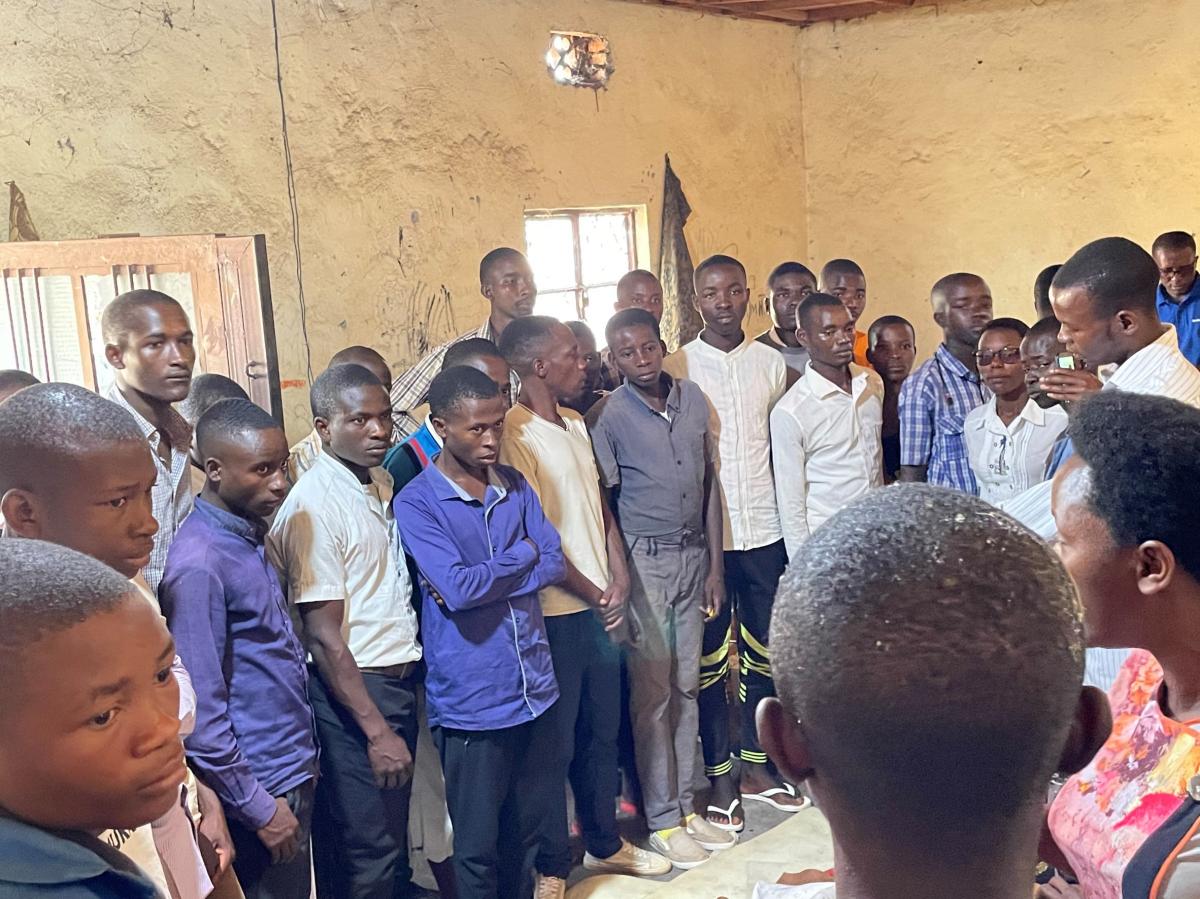Rechercher
Affichage de 1920 à 1935 sur 3126 actualités
-
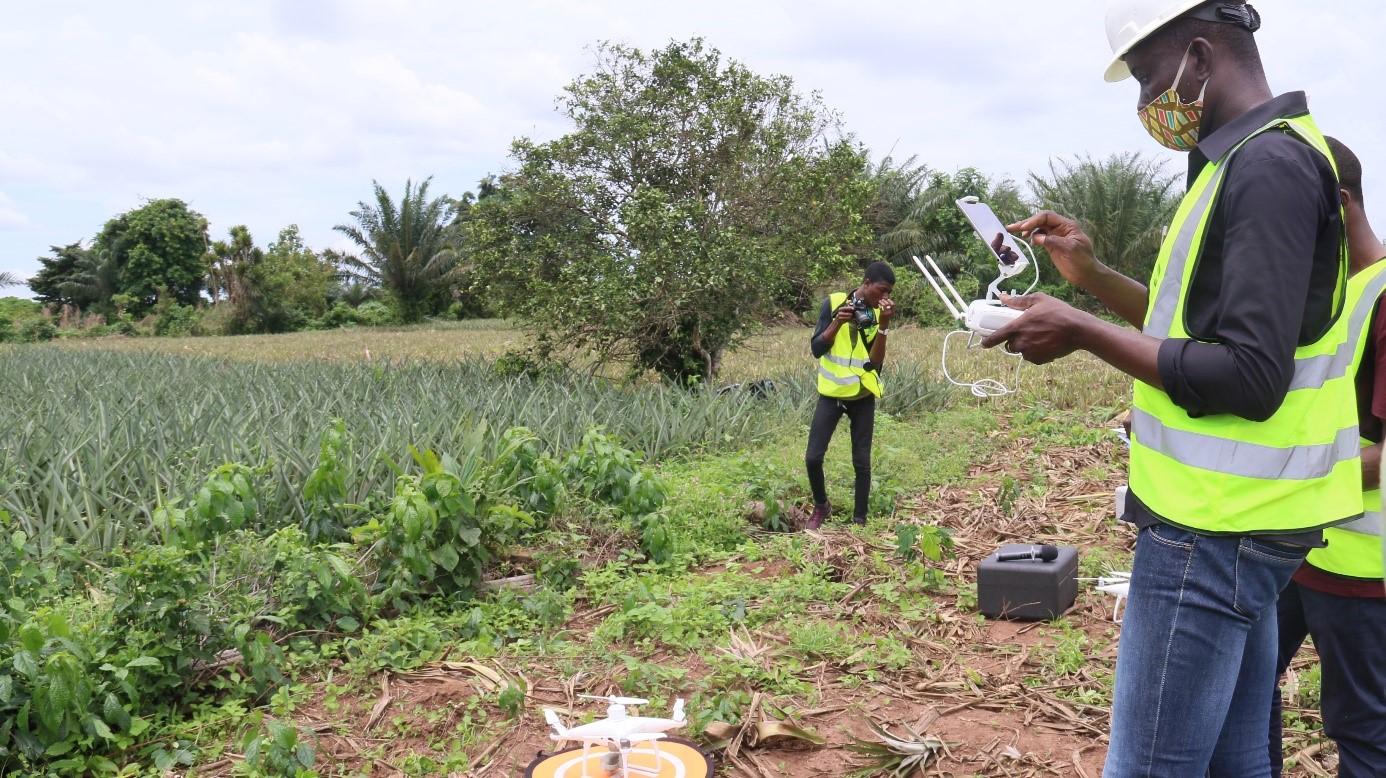
Manipulation des drones et interprétation des données : des agents de conseil agricole et de contrôle outillés
Reece-hermine ADANWENON | 16/07/2021
Démarré en 2019, le programme « Développement de l’Entreprenariat dans la Filière Ananas » (DEFIA) financé et exécuté par Enabel, œuvre pour contribuer à une agriculture intelligente face aux changements climatiques et pour l’amélioration des marges des producteurs. Dans cet optique, DEFIA a entrepris de mettre en place, avec la contribution de l’entreprise Global Partners, spécialisée dans les applications de drones, une solution digitalisée de conseil agricole basée sur l’usage des drones. Elle propose aux producteurs d’ananas du Bénin un dispositif composé de drones et d’algorithmes d’interprétation d’images permettant :de déterminer la superficie des champs, de compter les fleurs et les fruits,et d'identifier les zones et natures des stress (maladies) des cultures.En prélude au déploiement de cette innovation sur le terrain, une formation à l’usage de la solution adressée aux agents de conseil agricole des ATDA 5, 6 et 7, des OPA et des DDAEP intervenant dans la filière ananas a eu lieu du 17 au 28 mai 2021 à Allada. Cette formation permettra aux agents de conseil agricole des ATDA 7,6,5, agents conseillers techniques spécialisés de structures privées en contrat avec DEFIA de disposer des compétences, connaissances en techniques et méthodologiques, attitudes et aptitudes requises à la réalisation des missions de survol de drones et à l’élaboration de diagnostic de l’état phytosanitaire des exploitations d’ananas.
-
L’entrepreneuriat, un des piliers du développement pour les jeunes du secteur de l’enseignement des métiers
Donavine KWIZERA | 16/07/2021
Le 13 juillet 2021, le projet ACFPT en partenariat avec Spark et le Centre de Formation Professionnelle de Rumonge a organisé une journée de sensibilisation sur l’entrepreneuriat. L’entrepreneuriat joue un rôle clé dans la progression de l'économie du Burundi. Il est donc important que les jeunes maîtrisent à la fois l'esprit entrepreneurial et ses compétences. C’est dans ce cadre qu'Enabel a démarré un partenariat avec l’ONG néerlandaise Spark et le Centre de Formation Professionnelle de Rumonge. Avec son programme Akazi Keza, Spark veut créer 6 000 emplois en quatre ans : pour atteindre cet objectif, une formation sera organisée par Spark à l’endroit de 100 lauréats de ce centre, dont 20 seront sélectionnés et accompagnés après un concours de plans d’affaires. Il est envisagé d'étendre cette expérience aux autres centres soutenus par le projet ACFPT. Pour démarrer ce projet pilote à Rumonge, une journée de sensibilisation sur l’entrepreneuriat a été organisée à l’endroit des lauréats et des anciens de ladite école pour les conscientiser sur l’importance de créer leurs propres entreprises. Cette journée de sensibilisation a commencé par la visite de deux savonneries et d’un atelier de menuiserie, trois micro-entreprises accompagnées par Spark qui œuvrent dans le domaine de promotion de l’entrepreneuriat surtout des jeunes. Les activités se sont poursuivies au CFP Rumonge par une visite des Unités d’Appui Pédagogique (UAP) au sein de l’école ; la journée était aussi agrémentée par les témoignages des anciens lauréats et des entrepreneurs accompagnés par Spark. Ainsi, pour UWIMANA Claude de la promotion certifiée en 2019 son métier d’électricité lui a permis d’avoir un revenu stable et de construire sa propre maison. Il a prodigué des conseils aux autres lauréats en mentionnant que l’un des avantages d’un métier est de s’auto-employer, ce qui cadre avec l’entrepreneuriat. Un métier exige une certaine discipline pour gagner la confiance des clients. "Pour aller loin dans la vie en tant qu’entrepreneur, il faut toujours épargner " a poursuivi Claude. Le coordonnateur de Spark à Rumonge, Vincent BIHIMVYUMUDERI, a fait savoir aux lauréats qu’après la formation ceux-ci seront appelés à participer à un concours de plans d’affaires qui permettra de sélectionner les projets les plus prometteurs. Spark accompagnera les projets sélectionnés par le biais de formations continues et de séances de coaching à travers son programme Akazi Keza. Les différents partenaires tels que l’administration, les membres des cellules d’insertion de 14 autres centres appuyés par le projet ACFPT, un représentant de la Direction Générale de l’Enseignement Technique, de la Formation Professionnelle et des Métiers (DGETFPM) ont participé à cette journée ainsi qu’un représentant d’une institution financière qui a exhorté les lauréats à s’intéresser aussi à une éducation financière et à l’épargne. Autour de 300 apprenants et 100 anciens lauréats étaient enthousiastes de participer à cette journée importante qui marque le début de leur voyage entrepreneurial.
-
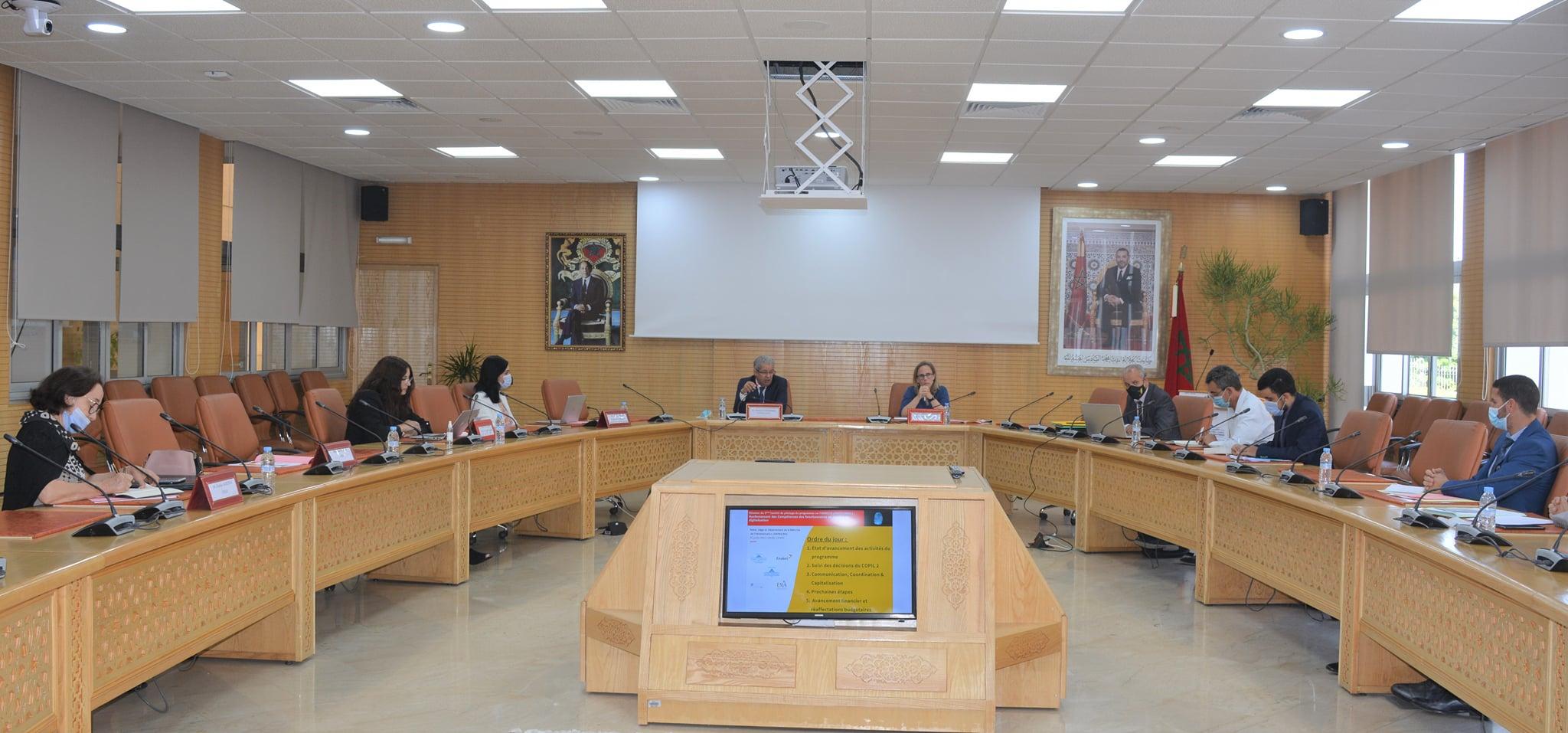
Réunion du 3ème comité de pilotage du programme e-TAMKEEN - Maroc
Bassam ALAOUI MDAGHRI | 15/07/2021
Le 1er Juillet 2021, le programme e-TAMKEEN de renforcement des compétences des fonctionnaires femmes et hommes au niveau central et local en matière de digitalisation, a tenu son troisième Comité de Pilotage au sein du Département de la Réforme de l'Administration.La rencontre a regroupé des représentants d'Enabel, du Département de la Réforme de l'Administration, de l'Agence de développement du Digital (ADD), de l'Ecole Nationale Supérieure de l'Administration (ENSA) et de la Direction du Budget relevant du Ministère de l'Economie, des Finances et de la Réforme de l'Administration (MEFRA).Les discussions étaient centrées principalement sur la présentation de l'état d'avancement du programme et sur la validation des chantiers phares en cours de lancement lors de cette année 2021.
-
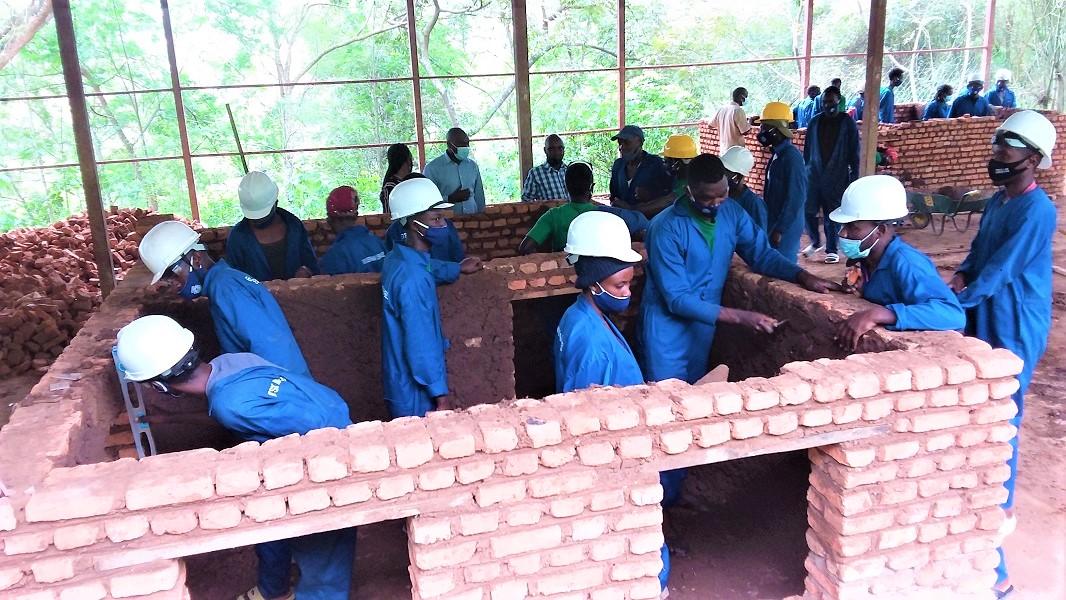
Dual training, a Work-Place Learning programme of Enabel’s UEDi intervention in Rwanda
Denise NSANGA | 15/07/2021
As part of the intervention implemented in partnership with the Local Administrative Entities Development Agency (LODA), the Belgian Cooperation, through Enabel’s Urban Economic Development intervention (UEDi), funds a dual training programme implemented in partnership with Rwanda TVET Board (RTB). The programme focuses on skills development in construction trades including masonry, plumbing, welding, electricity, and carpentry. It puts more emphasis on the use of Made in Rwanda construction materials. Apprentices spend 1-3 months at school to acquire relevant theoretical and basic practical skills to prepare them for workplace integration. The UEDi Work-Place Learning (WPL) intervention focuses on cooperative modern training with companies in the formal construction sector with the aim to contribute to the implementation of TVET and WPL policies and to make TVET more relevant and demand-driven. Since March 2021, 145 candidates enrolled in the programme in three selected schools, namely Ecole Scientifique et Technique (EST) Busogo, Saint Martin Gisenyi, and Saint Kizito Musha TVET schools. In May 2021, all trainees were placed in construction companies for work-based learning where they are coached by in-company instructors to enhance their hands-on skills and workplace attitudes. In the workplaces, trainees acquired a variety of practical skills such as setting out a construction site, foundation and wall elevation, steel fixing and wall plastering to mention but some. Though the training is ongoing, some company owners and trainers had such appreciation for the work of trainees and their attitudes that they already hired some of them.
-
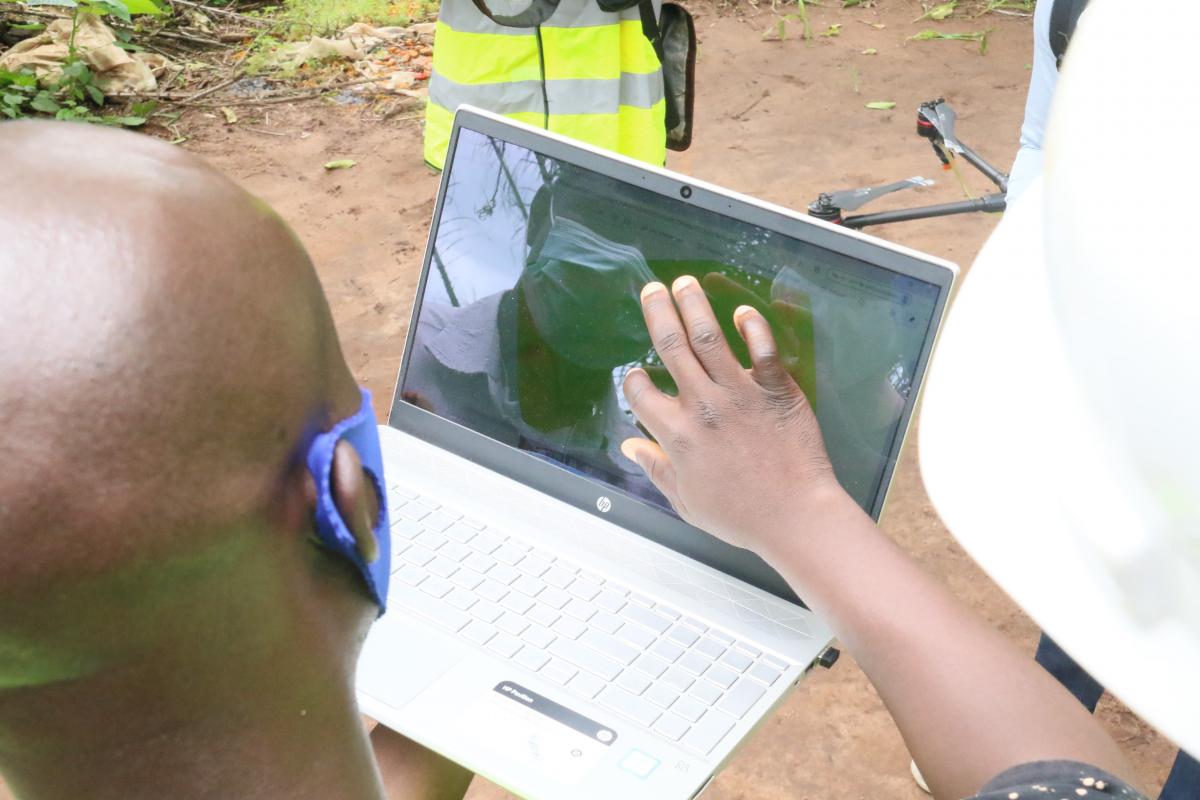
Accompagnement à la digitalisation et à la professionnalisation de la filière ananas au Bénin
Reece-hermine ADANWENON | 15/07/2021
Les producteurs d’ananas du Bénin ont désormais accès aux portails officiels des statistiques de la filière ananas au Bénin. Le droit d’administrateur leur a été attribué après une formation intense sur la gestion de la plateforme AKVO FLOW.Les administrateurs désignés par la Fédération Nationale des Coopératives des Producteurs d’Ananas du Bénin (FENACOPAB), le Réseau des Producteurs d’Ananas du Bénin (RéPAB), l’Association des Grands Producteurs d’Ananas du Bénin (AGPAB), la plateforme IRA et l’Association Interprofessionnelle de l’Ananas du Bénin (AIAB) sont outillés et aptes à alimenter et mettre à jour les informations en ligne concernant les producteurs via le portail AKVO du MAEP. Cela contribuera à améliorer la fiabilité des statistiques sur les producteurs d’ananas et leurs exploitations agricoles. En effet, la collecte des informations se fera dorénavant en interne par les producteurs eux-mêmes, avec l’assistance de leurs animateurs. Ils utiliseront aussi des outils digitaux de collecte et de traitement des données. Les producteurs s'engagent à être à la hauteur de cette responsabilité afin de toujours mériter la confiance du ministère de tutelle et par ricochet du gouvernement, ainsi que l’accompagnement des partenaires techniques et financiers. Ils promettent de mettre régulièrement à jour la base de données cartographique des producteurs réalisée en 2019 avec l’appui de DEFIA et l’accompagnement technique de l’Agence Territoriale de Développement Agricole (ATDA) pôle 7 et la DSI/MAEP et en faire aussi bon usage. C’est la Direction des Systèmes d’Information (DSI/MAEP) qui a donné la formation et qui assurera l’accompagnement technique des Organisations Professionnelles Agricoles (OPA) jusqu’à leur prise en main totale. L’appui de DEFIA pour cette formation est motivé par la durabilité des actions d'Enabel au Bénin. C’est pourquoi la stratégie d’accompagnement du programme met au cœur du processus de changement, les acteurs directs. Ensemble, le changement qualitatif et durable est possible !
-
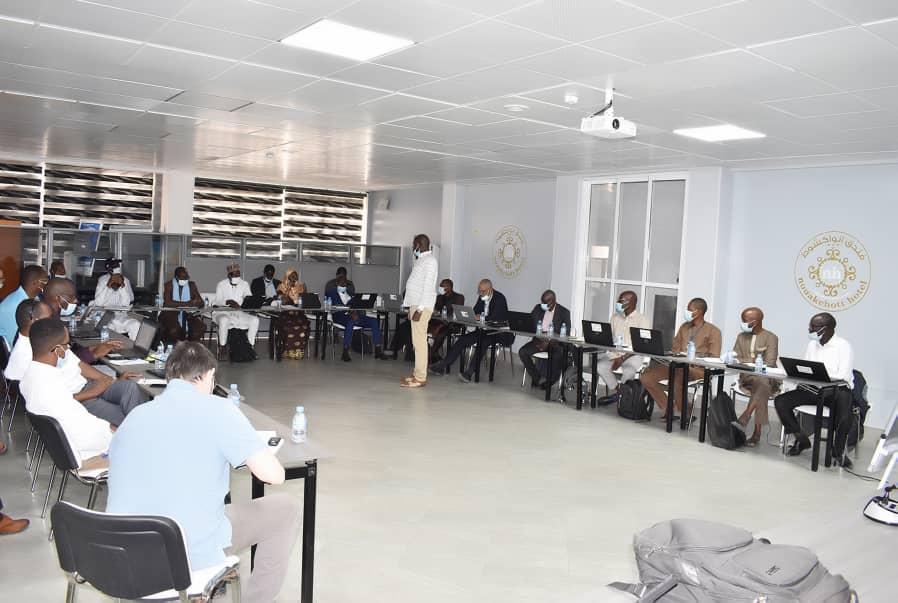
Atelier bilan de la première année de mise en œuvre des actions RIMDIR et des actions d’intermédiation sociale des ONG de Conventions subsides
Aminata KANE | 13/07/2021
Les 1 et 2 juillet à Nouakchott, Enabel a reçu les 4 ONG avec qui elle a signé des conventions de subsides. Cette rencontre avait pour but de réunir tous les partenaires au bout d'une année afin de partager le bilan des activités (techniques, administratives et financières), les résultats et leur avancement. L'occasion également d'effectuer un partage d'expériences, de formuler des recommandations à suivre pour l'avenir et de tirer des leçons pour améliorer les performances des interventions.Les ONG, réparties par wilayas (régions), sont les suivantes : COOPI pour le Hodh El Chargui, OXFAM pour le Hodh El Garbi, GRET pour le Guidimakha et VSF (Vétérinaires Sans Frontières) pour l'Assaba.Pour arriver aux résultats attendus, plusieurs processus ont été mis en place pour chacune des ONG:• Identification et priorisation des infrastructures rurales et productives (IRP)• Mise en place des accords sociaux (foncier et gestion) et des aménagements• Accompagnement des COGES (Comité de Gestion)En partenariat avec COOPI, dont la mission est de favoriser la participation communautaire dans la sélection, construction et gestion des infrastructures productives, et les résultats atteints sont les suivants :• Approbation de l'accord par les autorités;• Appropriation de l'accord par les communautés;• 3 digues en cours de réhabilitation;• 376 km de pare-feu réalisés;• Protection de la Berge de Néma d'une longueur de 682 ml en cours de réalisation;• 368 personnes maitrisent les techniques de réalisation des pares-feux manuel dont 66 femmes soit 18%;• 103 personnes connaissent les techniques de protection des berges dont 15 femmes soit 15%;• 14 COGES (Comité de Gestion) qui maitrisent les sujets suivants sont mis en place:1. 5 en gestion administrative et financière2. 5 COGES en techniques d’ouverture de pare-feu manuel3. 3 COGES ont des connaissances en techniques de réhabilitation des digues (HIMO)4. 1 COGES a des connaissances en techniques de protection des berges contre les ravinementsHodh El Garbi en partenariat avec OXFAM a mené des actions d'ingénierie sociale pour l'accès et la gestion durable des investissements productifs ruraux. Les résultats atteints sont les suivants :• 19 sites en cours de validation;• 3 ententes foncières établies et signées;• Répartitions foncières en cours ainsi que les ententes de gestion;• 5 ha de terres récupérées sur 10 prévues;• 2/3 des diguettes achevées, troisième en cours;• 55 Km de pare-feu mis en place et• 2 comités mis en place au niveau des sites pilotes (formés en gestion organisationnelle, maintenance et gestion des infrastructures hydro-agricoles)Les réalisations pour l'Assaba en partenariat avec VSF sont:• 4 accords sociaux signés• Formations sur la maitrise d'ouvrage communal et sur l'identification, la catégorisation et la priorisation des investissements: 60 représentants des parties prenantes, 3 inspecteurs du MDR et 3 du MEDD• Implication des parties prenantes dans la réalisation des infrastructures sans aucun problème lors des exécutions• Transfert des compétences• Identification des 21 sites pour la sélection des IRP à faire en 2021 - 2022• Identification de 39 zones agropastorales dégradées• Organisation des 3 réunions de CODEP (Comité Départemental)• Etablissement d’une carte avec les zones dégradées• Réalisation de 100 km de pares-feux manuels dans 2 communes• 130 ménages ont bénéficié de l’approche HIMO• 4 COGES sont mise en place des • Appui à la mise en place de services d’appui-conseil aux parties prenantes et aux points focaux de durabilité pour assurer l’entretien des infrastructures réalisées et leur exploitation durable• Appui à la participation équitable des hommes et des femmes à la gestion des investissements structurants et à la prise de décision au niveau communautaire.Pour le Guidimakha en partenariat avec GRET les résultats atteints sont les suivants :• 1 aménagement hydro-agricole• 3 points d'eau pastoraux• 1 axe de désenclavement• 4 parcs de vaccination• 4 périmètres maraichers• Ateliers de renforcement des capacités• Mise en place des comités de gestion dans les pôles de développement• Mise en place des accords sociaux • 900 km de bandes de pare-feu manuels réalisés• Mise en place des aménagements CES/DRS: 6 seuils en gabions avec des diguettes filtrantes sont réalisés à 80%.Pour le volet Enabel Représentation:• Présentation état d’avancement des infrastructures• Présentation état d’avancement appui institutionnel• Présentation outil suivi de catégorisation COGES• Présentation des activités du RIMFIL• Présentation PPT suivi administratif et financierPour illustrer l'état d'avancement des travaux des sites pilotes, quelques chiffres:• Lot 1 100% Assaba• Lot 2 90% Assaba/Hodh El Gharbi• Lot 3 82% Hodh El Chargui/Hodh El Garbi • Lot 4 60% GuidimakhaLes recommandations qui sont ressorties de cet échange fructueux sont:• L'importance d'une synergie, harmonisation et cohérence entre les actions;• Un renforcement des capacités spécifiques;• La traduction en arabe des accords sociaux;• L'élaboration d'outils de suivi des comités de gestion et• Toutes les ONG doivent avoir achever les travaux avant décembre 2022 Pour conclure, on peut dire que les résultats rapprochent le RIMDIR de son objectif qui est d'améliorer durablement et équitablement l’accès aux services et infrastructures productives et énergétiques des populations les plus vulnérables.
-
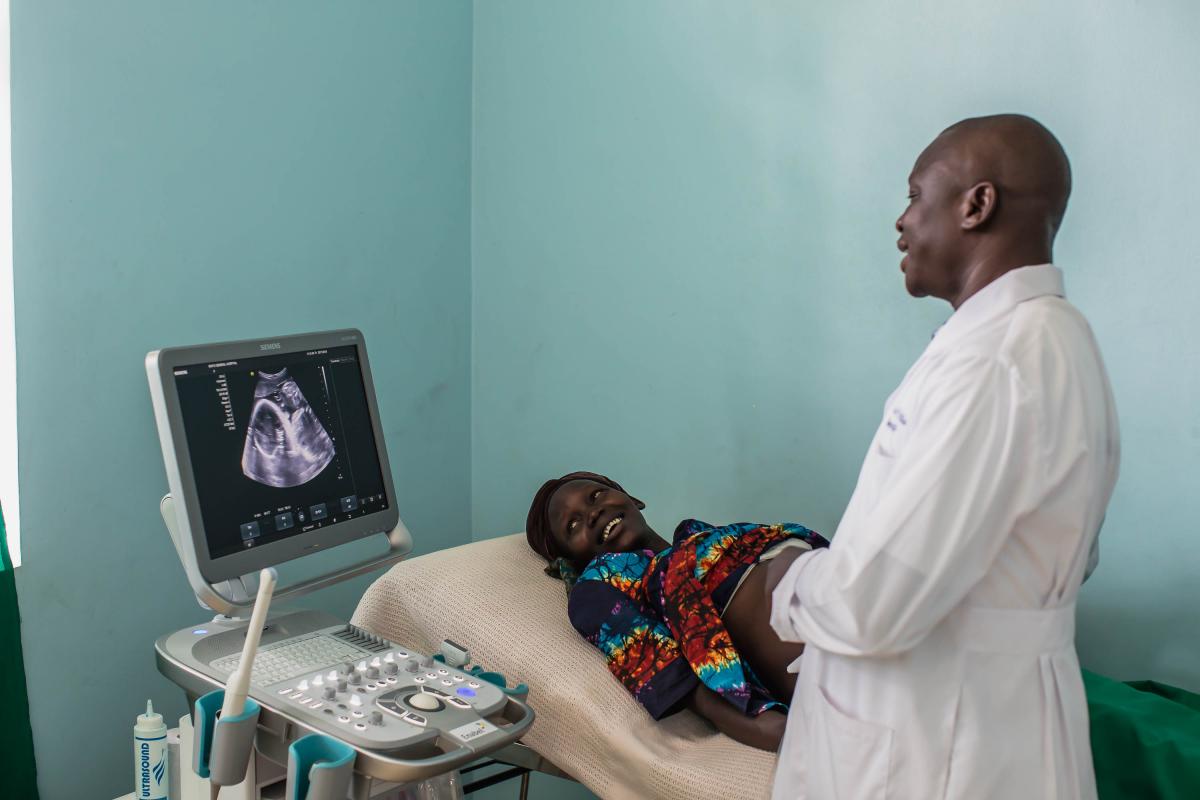
Zombo residents celebrate restoration of x-ray services
William YEKA | 13/07/2021
Expectant mothers in Zombo and surrounding areas can now breathe a shy of relief following the reinstatement of the Imaging Unit at Holy Family Hospital Nyapea. The unit was closed by the Atomic Energy Council of Uganda in 2015 over failure to meet basic minimum standards. The shutdown meant that patients had to travel long distances to access x-ray services from private health facilities in neighbouring districts at exorbitant fees. However, there is now a reason to smile. The hospital was donated imaging equipment by the Strategic Purchasing of Health Services (SPHU) and Private Not for Profit (PNFP) projects of Enabel. While the support was a major boost, the facility could not instantly use the items. Holy Family Hospital Nyapea lacked skilled manpower to operate the machines. To address the challenge, Enabel, through the Support to the Development of Human Resources project, sponsored one staff member to pursue a diploma in diagnostic ultrasound. The imaging unit, which 5 years ago was non-existent, is now fully functional and serves at least 30 patients daily, mostly expectant mothers. “Timely performance of imaging examination has eased work since we make quick clinical care decisions,” says Dr Okello Pius, the Officer In charge of the Maternity Ward. That is not all. The facility has registered an increase in revenue from user fees which management attributes to the imaging unit. Measures are in place to ensure sustainability. The trained sonographer is currently mentoring colleagues to do the same work. The hospital is also sponsoring another staff member to pursue a diploma in medical radiography to meet the growing demand. Holy Family Hospital Nyapea commonly referred to as Nyapea Hospital is a private not-for-profit faith-based health facility in Zombo district.
-

Switching to light: Electricity access - Stories of change
Denise NSANGA | 07/07/2021
The Government of Rwanda has a target of reaching 100% electricity access by 2024, where 52% of connections are planned through on-grid and 48% through off-grid connections. With Electricity Access Rollout Program (EARP), Belgium has a grant funding of 39M euros as a contribution to reach the universal electricity access target. Implemented in partnership with Rwanda Energy Group (REG), the BE-EARP project so far constructed over 1,000 km of power network particularly in the Eastern Province districts of Rwamagana, Kayonza, Ngoma and Kirehe. Alongside, the project has connected among others 25 schools, 11 health posts, 400 plus businesses and Small and Medium Enterprises (SMEs), and 32 public administrations. The project also funded the upgrade of 50 km of power distribution network in Rubavu, a picturesque western border town of Rwanda. Today, the stories of the beneficiaries reaping the benefits of BE-EARP electrification-funded projects, expectedly, have been amazing. Discover them below.
-
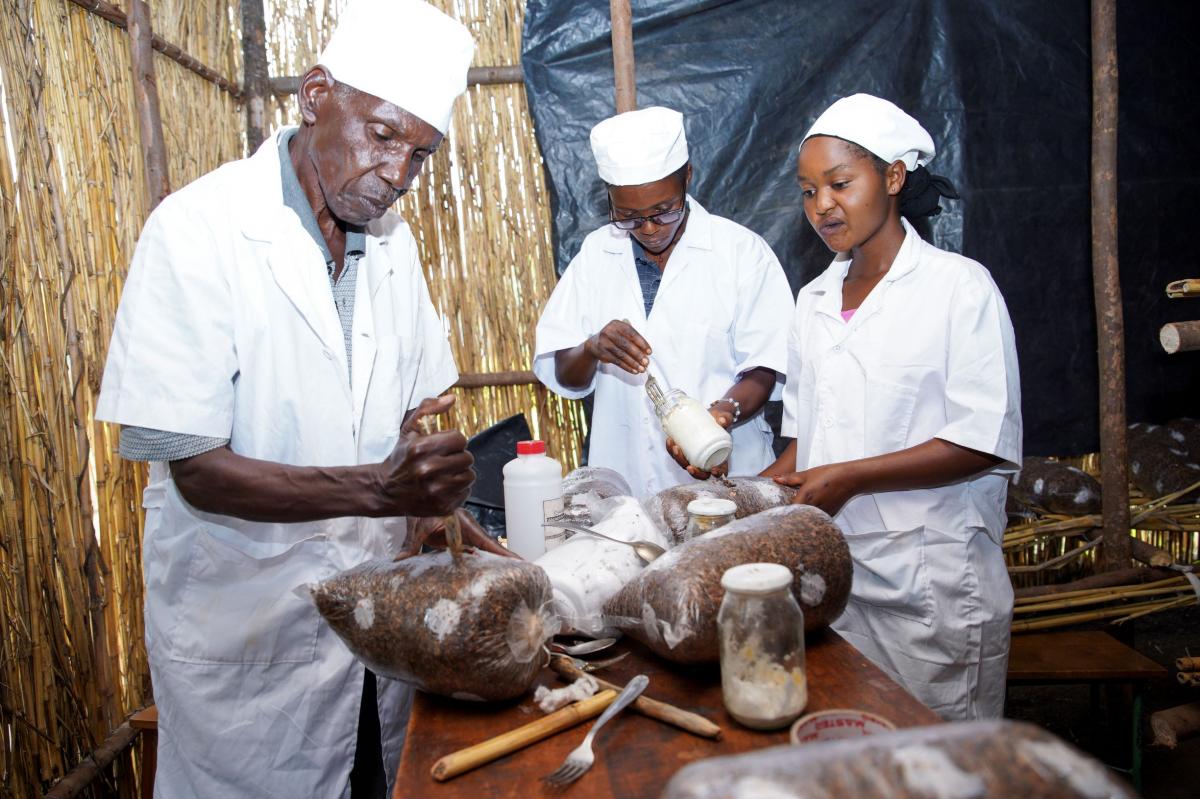
Vers l’amélioration de l’adéquation formation-emploi dans le secteur de l’Enseignement de la Formation Technique et Professionnel (EFTP)
Donavine KWIZERA | 07/07/2021
Au Burundi, l’un des objectifs du projet ACFPT est de contribuer à améliorer la qualité de la formation dans les filières présentes dans 13 Centres d’Enseignement des Métiers (CEM). Cependant, d’immenses défis persistent au niveau du suivi post-formation, notamment pour l’insertion des lauréats et leur employabilité sur le marché du travail. C’est pour relever ces défis qu’Enabel vient de signer une convention ayant pour objet l’octroi d’un subside à un consortium de 5 chambres sectorielles membres de la Chambre Fédérale du Commerce et de l’Industrie du Burundi (CFCIB) identifiées sur base des filières enseignées dans les CEM appuyés par le projet. Dans le cadre du partenariat public-privé, ce consortium a pour mission de contribuer à l’amélioration de l’adéquation formation-emploi dans le secteur de l’EFTP à travers la participation des opérateurs économiques dans la gestion des mécanismes d’insertion durable et de qualité des lauréats des CEM. Il devra mettre en place des stratégies et des activités visant à réduire le fossé existant entre les besoins du marché et l’offre de formation. Les activités ont officiellement été lancées lors des ateliers organisés les 28, 30 juin et 2 juillet, respectivement dans les provinces de Gitega, Muyinga et Cibitoke. L’occasion de mettre en lien les différents acteurs concernés, de les sensibiliser et réfléchir ensemble sur les actions qui seront menées collectivement.Conscientes des enjeux, les autorités administratives présentes ont exprimé leur engagement à soutenir le sous-secteur de l’EFTP qui figure dans les stratégies nationales pouvant contribuer aux solutions durables pour renforcer l’emploi des jeunes burundais.
-
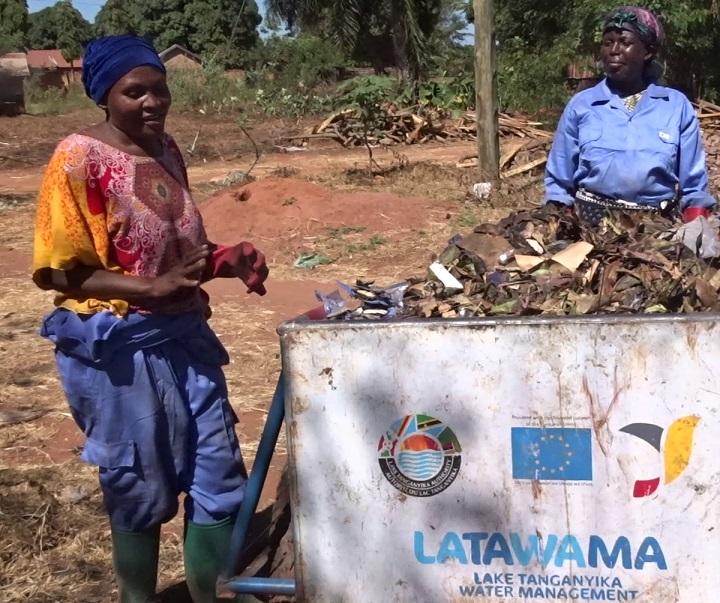
Kigoma, Tanzanie : Des actions d’optimisation de la gestion des déchets solides qui portent des fruits : les bénéficiaires s’expriment
Rodrigue NIYONGABO | 02/07/2021
Dans la ville de Kigoma, en Tanzanie, le projet LATAWAMA est opérationnel depuis janvier 2020. De nombreuses activités y sont menées. N’étant pas « un prêt à porter » les activités mises en œuvre ont été définies conjointement avec les principaux acteurs identifiés et divers intervenants. Les organisations à base communautaire sont des acteurs clés du cycle de gestion des déchets. D’autres actions à haut impact en matière de gestion des déchets ont été également initiées. Les bénéficiaires se sont confiés à l’équipe technique du projet. Les retours sont encourageants. Les organisations à base communautaire sont composées de femmes, chefs de ménages et de jeunes issus de milieux défavorisés avec un maximum de 10 personnes par organisation. Les membres de ces organisations sont responsables de la pré-collecte des déchets solides depuis différents lieux (ménages, marchés, institutions, etc.) jusqu’aux points de collecte (bennes basculantes gérées par la Municipalité). Elles sont une composante importante de la stratégie d’intervention du projet guidée par quatre principes: accroître la couverture des services, renforcer les capacités de gestion, introduire les principes de l’économie circulaire (utiliser les déchets d’hier comme ressource de demain), organiser des campagnes de sensibilisation et d’éducation.Initialement, les organisations à base communautaire étaient confrontées à deux grands défis : équipements insuffisants et inadéquats et capacités d’organisation et de gestion faibles. Face à ce constat, le projet LATAWAMA leur a fourni un premier soutien technique qui renforce leurs capacités d’intervention et a initié une série d’actions pour leur renforcement organisationnel. Des bénéficiaires satisfaits des réalisations du projet LATAWAMA Les membres des organisations à base communautaire ayant bénéficié directement de l’appui du projet LATAWAMA affirment que le matériel donné est venu à point nommé. Bahati Rhamadhani, mère d’environ 40 ans, vit dans la localité de Katubuka. Avec ses amies, en train de collecter les déchets, elle affirme que les équipements que le projet LATAWAMA a donné permettent de mener à bien le travail de collecte de déchets. « Avec ce travail, nous gagnons de l’argent et ça nous aide à satisfaire une partie de nos besoins. Nous remercions donc le projet LATAWAMA qui nous a donné du matériel. Comme vous pouvez le remarquer, Le défi majeur est que la population mélange encore les déchets ménagers avec d’autres choses comme les pierres, les briques et même les aiguilles. Nous essayons de les sensibiliser pour un changement de comportement », affirme-t-elle. Elishaphat Ruzemvya, Directeur du département en charge de la gestion des déchets solides, affirme que l’appui a été d’une grande importance pour améliorer la gestion des déchets solides à Kigoma. « Je suis ici pour témoigner de l’importance de l’appui apporté par le projet LATAWAMA en matière de gestion des déchets solides dans la municipalité de Kigoma. J’adresse mes remerciements à Enabel et à l’Union européenne pour l’appui apporté et je peux garantir que l’appui en termes d’équipement sera géré efficacement pour une grande durabilité ». D’autres actions ciblées initiées par le projet… A côté des actions menées à travers les organisations à base communautaire, des réalisations comme l’appui de l’hôpital Maweni en matière de gestion des déchets solides sont en cours. Rashidi Masoudi, agent d’hygiène, affirme que la situation s’est nettement améliorée en matière de gestion des déchets solides dans cet hôpital. « Avant le travail était beaucoup plus difficile. On brûlait les déchets dans un endroit qui n’était pas adéquat. Avec la réparation de l’incinérateur, le travail devient plus facile. Les déchets y sont brûlés. Nous avons été formés sur la gestion des déchets biomédicaux. C’est la 5ème année que je travaille à l’hôpital de Maweni. Les choses vont très bien maintenant ; tous les déchets qui sont produits ici sont brulés complètement ». Pour Rajabu Hassan, Ingénieur biomédical, avant, l’hôpital disposait d’un incinérateur de mauvaise qualité, qui ne pouvait pas brûler les déchets selon les standards environnementaux acceptables. « Le projet LATAWAMA nous a permis de réparer l’incinérateur qui permet de brûler les déchets rapidement. Les cendres qui sont générés sont également mis dans la nouvelle fosse qui répond aux normes de l’Organisation Mondiale de la Santé et du ministère ayant dans ses attributions la santé publique. Nous sommes tous conscients que les déchets biomédicaux sont dangereux et nous sommes reconnaissants envers le Projet LATAWAMA ». Rajabu Hassan souhaite néanmoins poursuivre la collaboration avec le projet qui financera la construction du bâtiment destiné au stockage des déchets biomédicaux triés en attente d’incinération. Financé par l’Union européenne, le projet LATAWAMA est mis en œuvre par Enabel, en collaboration avec l’Autorité du Lac Tanganyika.
-
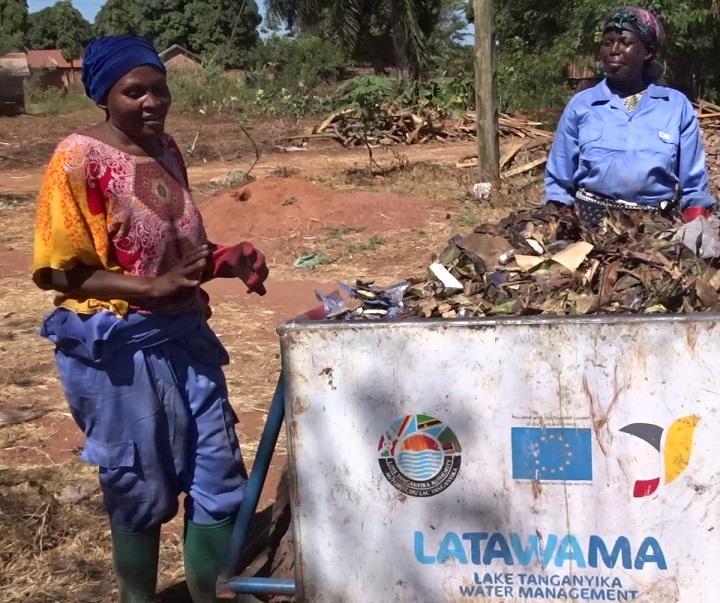
Kigoma, Tanzania: Actions to optimise solid waste management bear fruit
Rodrigue NIYONGABO | 02/07/2021
In the city of Kigoma, Tanzania, the LATAWAMA project has been active since January 2020. Many activities have been carried out. As the project was not a “ready-made project,” the activities have been defined and the main actors identified with the full participation of various stakeholders. Community-based organisations are one of the backbones of solid waste management operations. Besides, other actions in waste management have also been undertaken. Beneficiaries talked to the technical team. The feedback is heartening. Community-based organizations are composed of women heads of households and young people from disadvantaged backgrounds, with a maximum of 10 people per organisation. They are responsible for the pre-collection of solid waste from different places (households, markets, institutions, etc.) to the collection points (tippers managed by the Municipality). They are keys players of a project guided by four principles: increasing service coverage, strengthening management capacity, introducing the principles of the circular economy (using yesterday’s waste as a resource for tomorrow), organising awareness and education campaigns. At the beginning of the project, community-based organizations faced two major challenges: inadequate facilities and weak organisational and management capacities. The LATAWAMA project provided technical support to community-based organisations to ensure that they could carry out their mission and initiated a series of actions for organisational strengthening. Partners satisfied with LATAWAMA project achievements The members of the community-based organizations directly supported by the LATAWAMA project said that the material given was of paramount importance. Bahati Rhamadhani is a mother of about 40 years, living in the locality of Katubuka. With her friends, while collecting the waste, she said that the equipment that the LATAWAMA project gave them makes it possible to collect the waste. “With this work, we get money, and it helps us meet some of our needs. We, therefore, thank the LATAWAMA project which gave us material”. The remaining challenge is that the population still mixing household waste with other things like stones, bricks, and even needles.“ We try to sensitize them for a behavior change”, she said. The same goes for Elishaphat Ruzemvya, Director of the department responsible for solid waste management. He said that the support was of great importance for improving solid waste management in Kigoma: “I am here to attest to the importance of LATAWAMA’s support for solid waste management in the Municipality of Kigoma. I would like to thank Enabel and the European Union for their support. I can guarantee that the support in terms of equipment will be managed effectively for great sustainability”. Other actions initiated by the project… In addition to actions carried out through community-based organisations, further activities such as the support of the Maweni Hospital for solid waste management have also been initiated. Rashidi Masoudi, a health officer, said the situation had improved significantly in solid waste management at this hospital: “Before, the work was much more difficult. The waste was burnt in a place that was not adequate. With the repair of the incinerator, the work became easier. We have been trained in biomedical waste management. This is the 5th year that I work at Maweni Hospital. Things are going very well now; all the waste produced here is burned completely”. For Rajabu Hassan, Biomedical Engineer, the hospital used to have a poor-quality incinerator, which could not burn waste according to acceptable environmental standards. “The LATAWAMA project repaired the incinerator that allows us to burn waste quickly. The ashes generated are also put in the new pit that meets the standards of the World Health Organization and the ministry of public health. We are all aware that biomedical waste is dangerous, and we are grateful to the LATAWAMA Project.” Nevertheless, he would like to further collaborate with the project, which will fund the construction of the disposal hall of sorted waste awaiting incineration. Funded by the European Union, the LATAWAMA project is being implemented by Enabel in collaboration with the Tanganyika Lake Authority.
-
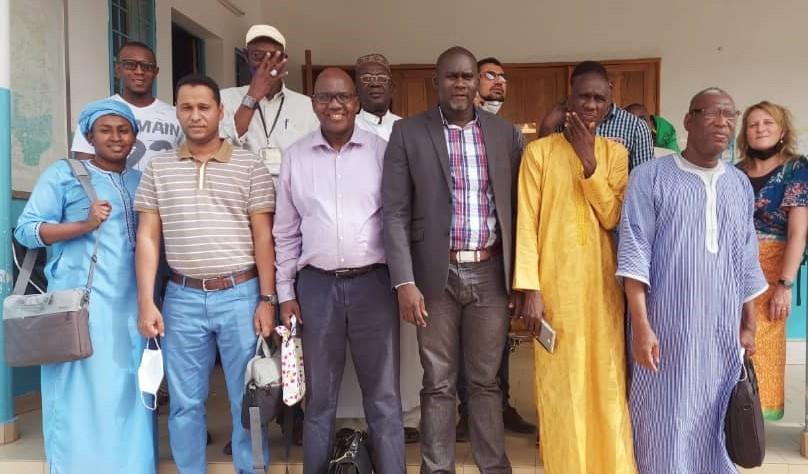
Visite de partage d’expérience de la Mauritanie sur le modèle sénégalais afin de contribuer à l’opérationnalisation de l’Assurance Maladie Volontaire
Aminata KANE | 30/06/2021
Afin de contribuer à l’amélioration de l’accessibilité financière des populations des secteurs informels et ruraux aux soins de santé de qualité, l’état mauritanien a procédé au lancement par le Ministre de la Santé, le mardi 18 novembre 2020 à Nouakchott, d’un régime d’assurance maladie volontaire (AMV) dénommé les Caisses Régionales de Solidarité Santé (CRESS).Les CRESS visent à concourir à la couverture sanitaire universelle en Mauritanie ; phase pilote de mise en œuvre effective dans trois régions sanitaires de la Mauritanie (Brakna, Dar Naim et Sebkha). En tenant compte de toutes les contraintes et défis que peut susciter l’opérationnalisation de ce régime d’assurance volontaire, un des piliers de ce programme est de renforcer les capacités du personnel administratif pour une gestion efficace et efficiente des CRESS, en se basant sur les expériences des autres pays de la sous-région. Dans ce cas ci celui du Sénégal. Le Sénégal qui a testé un modèle de mutualisation du risque lié à la maladie, avec l’Unité Départementale d’Assurance Maladie (UDAM) de Foundiougne et celle du département de Koungheul, constitue une opportunité pour l’équipe des CRESS d’apprendre des leçons de cette expérimentation. Une visite aux UDAM constitue un retour d’expérience enrichissant pour cette phase d’opérationnalisation de l’assurance maladie volontaire en Mauritanie. Ce voyage d’étude au Sénégal a permis de réaliser un retour d’expérience sur la gestion et l’opérationnalisation de la couverture maladie universelle dans les départements de Koungheul et de Foundiougne. Plus précisément:Un retour d’expérience sur le fonctionnement de l’UDAM au SénégalÉchanges sur les meilleures pratiques sur l’opérationnalisation et les difficultés rencontrées dans la mise en place de cette expérience d’assurance maladie volontaire.Visite de terrain pour analyser la gestion quotidienne des adhésions et des prestations de soins couvertes dans les deux districts sanitaires.Capitaliser sur les expériences du Sénégal au bénéfice de la MauritanieLes résultats qui sont ressortis de la mission sont:L’expérience des UDAM des départements de Koungheul et de Foundiougne est connue et comprise par les membres de la mission, notamment dans les domaines suivants : paquet de soins couverts, mode de gestion, régulation avec les prestataires, mise en œuvre du plan de communication pour la mobilisation sociale, etc.Les mécanismes de financement et de pérennisation des UDAM par l’état sénégalais sont connus et évaluésLes leçons sont apprises sur le modèle de management et de promotion de la mutualisation du risque lié à la maladie dans les départements de Koungheul et de Foundiougne : bonnes pratiques et difficultés rencontréesL’expérience du Sénégal est capitalisée pour l’initiative mauritanienne.Lors de la réunion de synthèse les points forts retenus sont que la mission a été un succès qui a permis à la Mauritanie d'avoir toutes les réponses aux questions qu'elle se posait. Les éléments qui ont été le plus mis en avant sont:l'importance de la qualité et proximité de l'offremission inspirante et enrichissantedévelopper la synergie entre l'offre et la demanderenforcement du dialogue interaction continue grâce à la mise en contact valorisation partenariat Mauritanie/Sénégalapproche inclusive de la populationéchanges de conseils techniques...Les priorités selon le représentant du ministère de la santé mauritanien Dr Moctar M’KHAITIR sont:une mise à niveau de l'offre de soins (répondre aux attentes de la population, améliorer équipements et Ressources Humaines)pousser à l’adhésion en donnant confiance via une sensibilisation efficace; " la santé n'a pas de prix mais elle a un cout"un engagement de l’État et des partenairesPour finir, cette mission a été productive et satisfaisante pour tous les partis. Une mise en lien a été faite et les équipes resteront en interaction continue. Les remerciements ont été chaleureux et indicateurs du bon déroulement tout au long de la mission. La réflexion sur l'ancrage des CRESS a été lancé, en attente des bons résultats à venir.
-
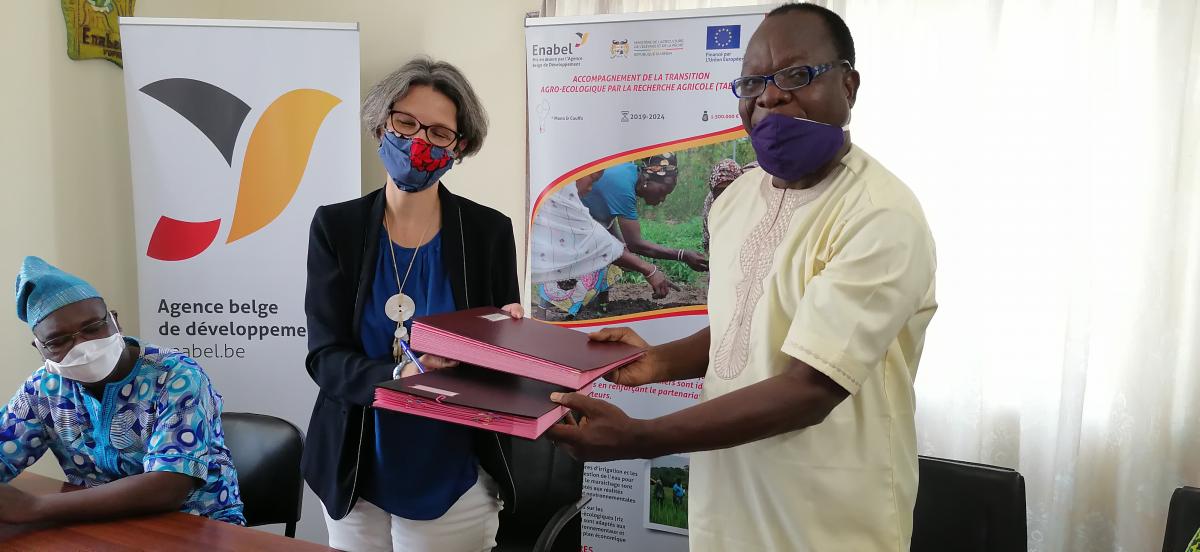
Signature de conventions de partenariat entre Enabel au Bénin et les universités nationales de Parakou et d’Abomey-Calavi
Reece-hermine ADANWENON | 30/06/2021
Réunir les acteurs du secteur agricole autour des recherches participatives dont les produits profitent aussi bien aux chercheurs qu’aux producteurs : tel est le but du projet TAERA (Transition Agro-Ecologique par la Recherche Agricole) financé par l’Union Européenne et mis en œuvre par Enabel au Bénin. Pour atteindre cet objectif, plusieurs étapes sont à franchir dont l’une d’elle est la signature de conventions de subside avec les universités nationales de Parakou et d’Abomey-Calavi qui a eu lieu le lundi 28 juin 2021 au Ministère de l’Agriculture, de l’Elevage et de la Pêche (MAEP).C’était en présence des responsables des universités, du chargé de programme de l’Union Européenne, du représentant d'Enabel, des représentants des organisations professionnelles de producteurs de riz et de produits maraîchers. Au Bénin, plusieurs innovations probantes sont issues de la recherche mais ne sont pas largement diffusées auprès des producteurs. De même, plusieurs innovations endogènes sont mal connues, mal documentées et par conséquent très peu diffusées. C’est pour apporter une solution à cet état de chose, que le projet TAERA s’est donné pour but de regrouper les chercheurs et les producteurs autour de thématiques de recherches co-définies pour aboutir à des solutions scientifiquement prouvées et auxquelles les producteurs s’identifient. Les conventions de subside signées entre ces différents acteurs permettront respectivement aux Universités d’Abomey-Calavi et de Parakou de : - valider les innovations agroécologiques performantes pour les systèmes de production maraîchère et rizicole et élaborer un référentiel d’aide à la décision dans le domaine de la transition agro-écologique ; - proposer des solutions « bonnes pratiques » adaptées en matière de gestion de l’eau dans les systèmes de maraîchage irrigués et les systèmes rizicoles de bas-fond sur la base de suivi technico-économique des modèles d’irrigation. Pour y parvenir, des doctorants, au nombre de deux par université, sont recrutés et seront accompagnés d’étudiants en master. Des expérimentations seront installées en collaboration avec les organisations de maraîchers et de riziculteurs sur les champs de ceux-ci. Ces universités sont représentées à leur tour par le Laboratory of Genetics Horticulture and Seed Sciences ou GBioS pour l’Université d’Abomey-Calavi et le Laboratoire d’hydraulique et de modélisation environnementale ou HydroModE-Lab pour l’Université de Parakou. En procédant à la signature de ces conventions, Mme Mélanie Xuereb, Country Portfolio Manager, a, au nom du Représentant Résident d'Enabel au Bénin, adressé ses remerciements au bailleur, l’Union Européenne et au partenaire de mise en œuvre, le Ministère de l’Agriculture, de l’élevage et de la pêche, ainsi qu’à toute la famille d’acteurs intervenant dans le projet, pour leur grande disponibilité et leur forte implication dans la formulation et la concrétisation du projet. Mme Mélanie Xuereb renouvelle, au nom de Enabel, l’engagement à relever les défis de la transition agro-écologique. Le Chargé de programme de l’Union européenne, M. Jean Huchon, a, pour sa part, souhaité à l’ensemble des partenaires du programme, une coopération fructueuse, ainsi que des résultats à la hauteur des enjeux du secteur pour le Bénin. A en croire M Jean Huchon, le projet TAERA dans son ensemble, contribue au renforcement des capacités nationales de la recherche agricole en générant des connaissances et des innovations scientifiques et technologiques dans les domaines de la production, de la transformation, de l’économie, des questions sociales et de l’organisation générale des chaînes de valeur. Il permettra également de développer l’architecture de la recherche nationale pour être plus efficace et propice à l’innovation et apportera des connaissances et des preuves pour alimenter les politiques et les décisions d’investissement. Quant au doyen de la Faculté d’agronomie de l’Université de Parakou, il a exprimé sa reconnaissance à l’Union Européenne, à Enabel, ainsi qu'à toutes les institutions pour leur soutien indéfectible et leur contribution à la mise en œuvre de cette intervention. Le Professeur Michel Batamoussi est convaincu que cette intervention donnera des résultats tangibles et aboutira à plusieurs autres collaborations futures. Rappelons que le projet Taera (Transition Agro-Ecologique par la Recherche Agricole) mis en œuvre par Enabel et financé par l’Union Européenne à hauteur de 1,5 millions d’euros (soit 984 millions de FCFA), s’inscrit dans le cadre de l’initiative Desira (Development Smart Innovation through Research in Agriculture). Il intervient dans les communes du Mono et dans deux communes du Couffo que sont Dogbo et Lalo, et travaille avec les producteurs maraîchers et riziculteurs pour la période 2019-2024. Taera vise à proposer des solutions innovantes fondées sur les résultats de la recherche-action menée en partenariat avec les acteurs locaux de la recherche ainsi que les producteurs pour une transition agro-écologique concertée au sein des filières maraîchage et de la riziculture.
-
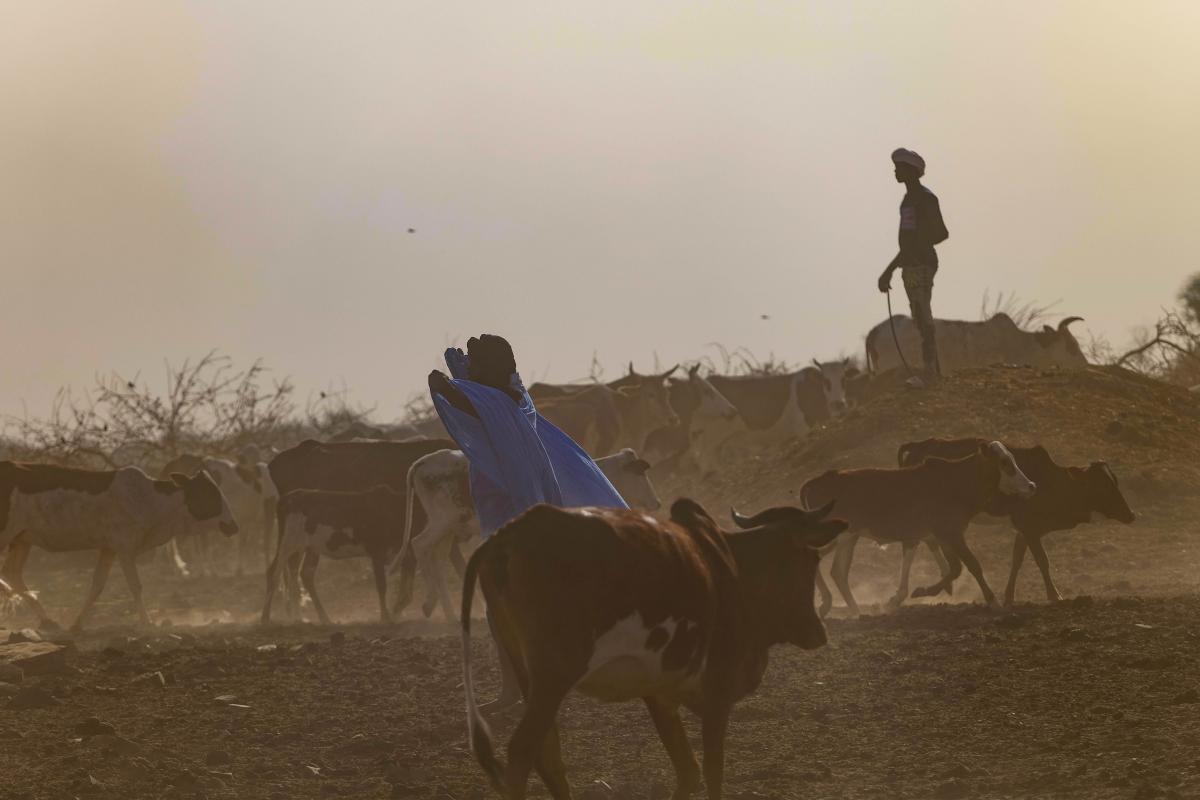
Enabel promeut une approche novatrice de vulgarisation auprès des pasteurs en Mauritanie
Aminata KANE | 29/06/2021
Le programme RIMFIL (Promotion du développement des filières agricoles et pastorales durables) d'Enabel Mauritanie a organisé un atelier de formation dont la finalité est d’accompagner des acteurs pastoraux tant en termes de structuration que d’acquisition de compétences organisationnelles ou techniques par la formation des facilitateurs autour d’un Champ Ecole Pastoral (CEP) au niveau du bassin laitier du Hodh El Charghi du 14 au 20 juin. La cérémonie d'ouverture de l'atelier de formation a eu lieu en présence du Hakem de Timbedra, du Maire de la commune de Timbedra et de l'inspecteur du ministère de l'élevage de la Moughataa de Timbedra.Selon l'expert promotion filières agricoles et pastorales durables Abder Benderdouche : " L’action d’Enabel vise à promouvoir et à renforcer le développement de chaînes de valeur agricoles et pastorales inclusives et durables, comme des leviers à la fois de croissance, mais aussi de résilience au changement climatique, de lutte contre la pauvreté et d’insécurité alimentaire". Grace à ces formations le programme RIMFIL contribuera à la construction d´un dispositif structuré et durable de conseil agro-pastoral sur les bassins de production basé sur la formation de formateurs au niveau des CEP/CEAP.Toujours d'après l'expert Benderdouche: "En termes de groupes cibles, le RIMFIL s’adressera à des communautés vulnérables en s’efforçant de mettre l´accent sur les jeunes et les femmes, et les encouragera à devenir des facilitateurs CEAP (Champs-écoles agricoles et pastoraux). A cet effet, les CEAP habiliteront et permettront aux petits exploitants agricoles, à leurs familles et aux communautés rurales de comprendre et de réagir aux défis actuels et d’apporter leurs propres contributions essentielles".L’objectif général est de mettre en œuvre un dispositif structurant de renforcement de capacités/formations de facilitateurs par le biais de l’approche Champ Ecole Agro Pastoraux (CEAP) et basé sur un curriculum de formation validé de façon participative avec tous les acteurs impliqués. Ces facilitateurs formés mis en réseau seront les relais d’un futur dispositif de conseillers éleveurs de proximité au sein des bassins de production. Permettra au RIMFIL de contribuer à la construction d´un dispositif structuré et durable de conseil agro-pastoral sur les bassins de production basé sur la formation de formateurs au niveau des CEP/CEAP.Les Champs-écoles pastoraux sont élaborés sur la base d’une approche participative avec une forte préoccupation de durabilité environnementale et de viabilité économique, ce qui apporte une implication forte des bénéficiaires et communautés.Les CEP sont une approche novatrice de vulgarisation auprès des pasteurs qui se basent sur la pratique et l'apprentissage. Pour garantir la durabilité de l'action, Enabel prévoit un suivi régulier des facilitateurs.
-
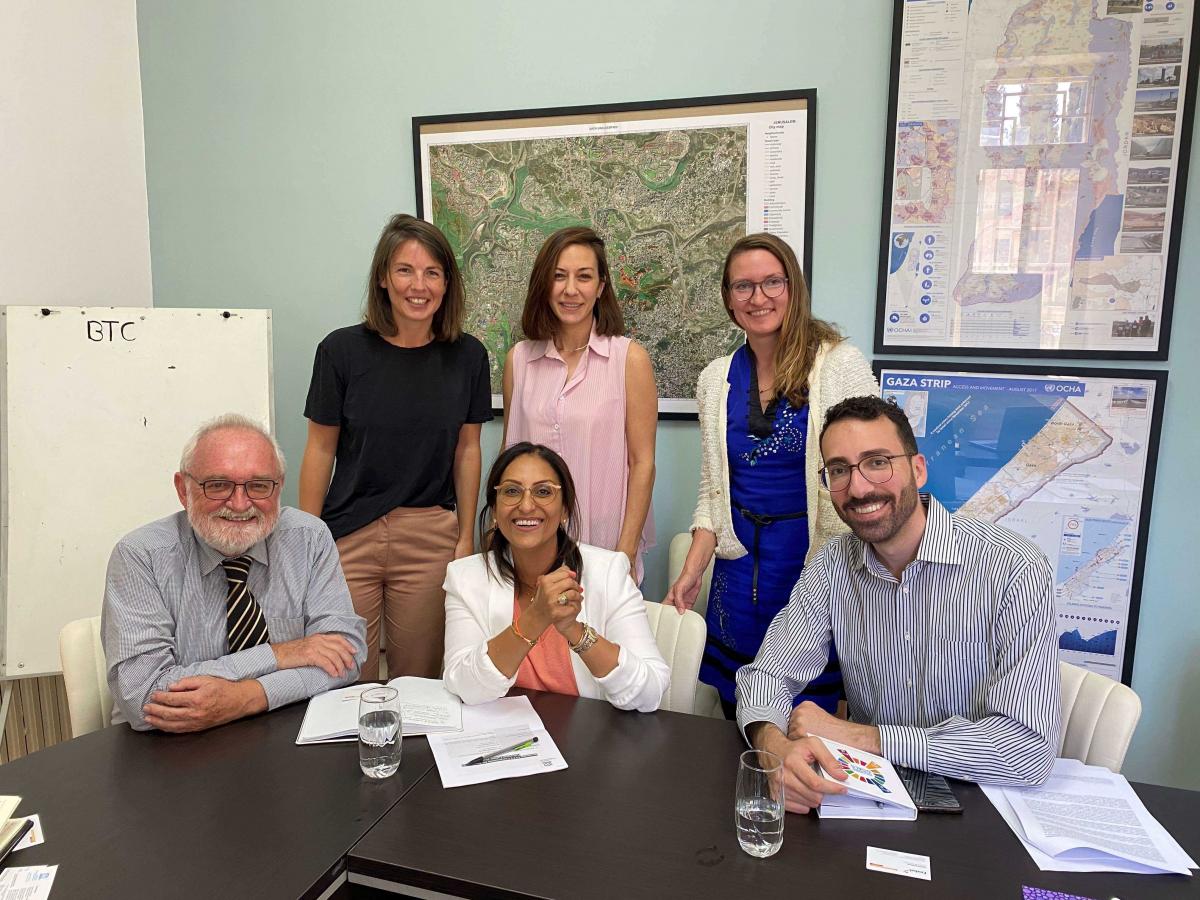
Enabel Palestine signs and agreement with UNESCO
Roula HANDAL | 28/06/2021
UNESCO and Enabel Palestine have recently signed a cooperation agreement titled “TVET Competencies for Youth in the Palestinian Labour Market”. The joint cooperation is an integral part of the Skilled Young Palestine intervention, already implemented by Enabel in cooperation with the Ministry of Labour.This agreement is the first formal cooperation between Enabel Palestine and UNESCO and will contribute to increasing the quality of the TVET-system and its outputs and will strengthen the local innovation eco-system with specific attention to inclusion.The agreement is signed for a period of two years and will kick-off with the set-up of a sectoral innovation hub. Other activities include working on updating the Skills Forecasting Model, development of online TVET courses and training of trainers. Another component of the project will focus on inclusion in TVET, both at policy level and implementation level.The two partners are looking forward to starting off the activities, and will work closely together with their partners throughout the implementation.
